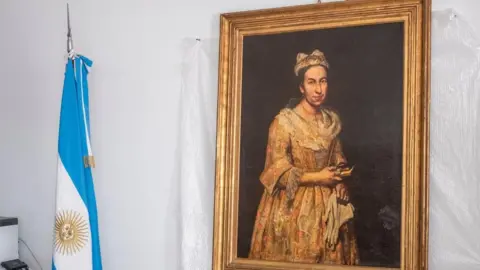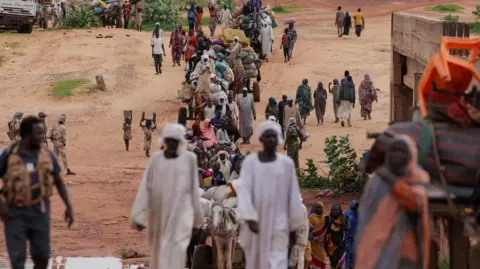In July 1995, more than 8,000 Bosnian men and boys were tragically murdered by Bosnian Serb forces in Srebrenica, marking one of the most horrific atrocities in European history since World War II. Today, the memory of this massacre not only evokes a profound sense of loss but also exposes ongoing political and ethnic tensions within Bosnia and Herzegovina.
A recent premiere of the play "Flowers of Srebrenica" at Sarajevo's War Theatre starkly illustrated the emotional turmoil surrounding the massacre, with scenes featuring individuals sifting through soil for clothing and personal effects of the deceased. This poignant reflection captures the unresolved grief and collective memory that has lingered since the events of those fateful days.
Bosniak victims sought refuge in Srebrenica, mistakenly believing that UN forces would protect them. However, Dutch soldiers stood by while General Ratko Mladić orchestrated the ethnic cleansing, evacuating women and children while overseeing the execution of thousands. The bodies were initially discarded in mass graves but were later exhumed and relocated to hide evidence of the crime, a reality that still haunts the families of the victims as they search for lost loved ones.
Despite the undeniable truth recognized at the international level—Mladić's conviction for genocide—significant portions of the Bosnian Serb political landscape continue to deny the existence of genocide, creating an environment where hatred and historical revisionism thrive. Selma Alispahić, a former refugee and lead actress, lamented the continued resistance to acknowledging the truth, reflecting on the fatigue felt by those who have tirelessly advocated for recognition of the massacre.
The ramifications of the 1995 Dayton Peace Agreement continue to frame Bosnia’s political landscape, dividing it along ethnic lines into the Federation and Republika Srpska. Recent actions by Milorad Dodik, president of Republika Srpska, to withdraw from national institutions and raise tensions have heightened concerns among citizens. The potential for renewed violence can be felt as the leader's political maneuvers evoke memories of past atrocities.
During the latest commemoration of the massacre, while Sarajevo was alive with tributes and reminders of the tragedy, the atmosphere in East Sarajevo was starkly different, with negligible public acknowledgment of the events. Saša Košarac, a minister in the Republika Srpska government, expressed that ongoing discussions about the Srebrenica massacre hinder reconciliation, arguing that a broader discourse about crimes across all ethnicities is needed.
In contrast, many continue to honor the memory of victims and seek solidarity with families affected. This push for remembrance was evident as groups from all over the country made their way to the Potočari Cemetery, emphasizing shared grief and the need for unity. However, perspectives like Mirela Osmanović’s reveal an unsettling truth: the rising ethnic animosities disturb a fragile peace and pose significant threats to future coexistence.
As political leaders manipulate historical narratives to maintain control, those living in the shadow of Srebrenica feel increasingly vulnerable. This manipulation not only deepens wounds but inhibits healing, leaving families to wonder what the future holds for a region still scarred by its past.






















